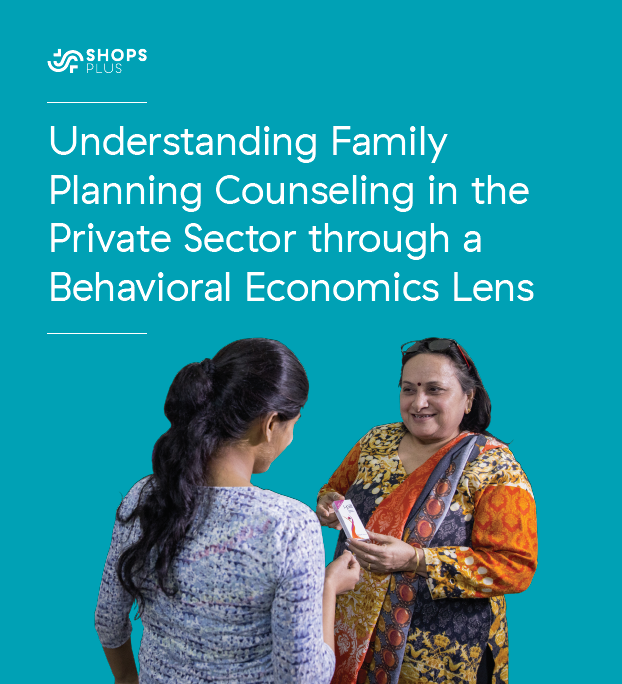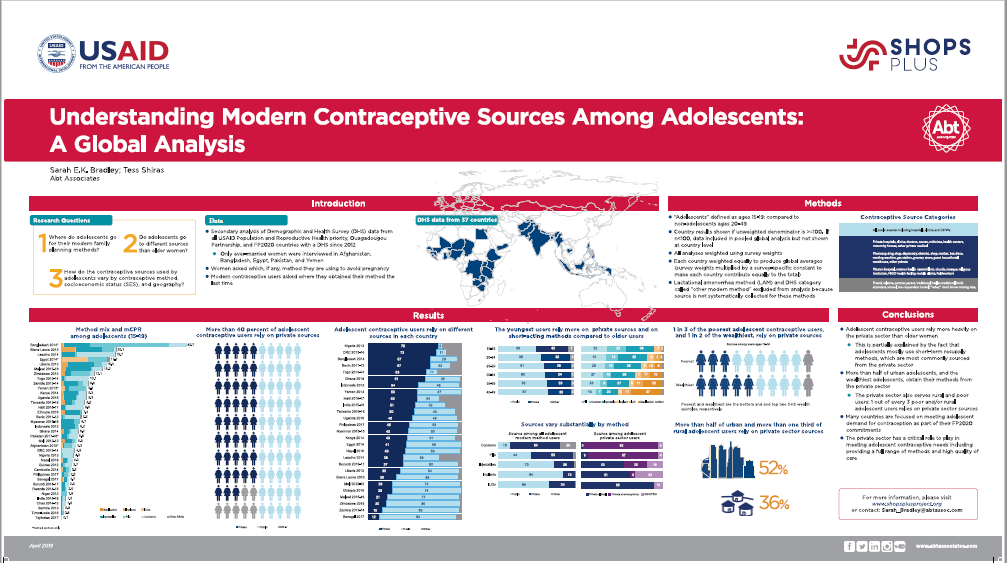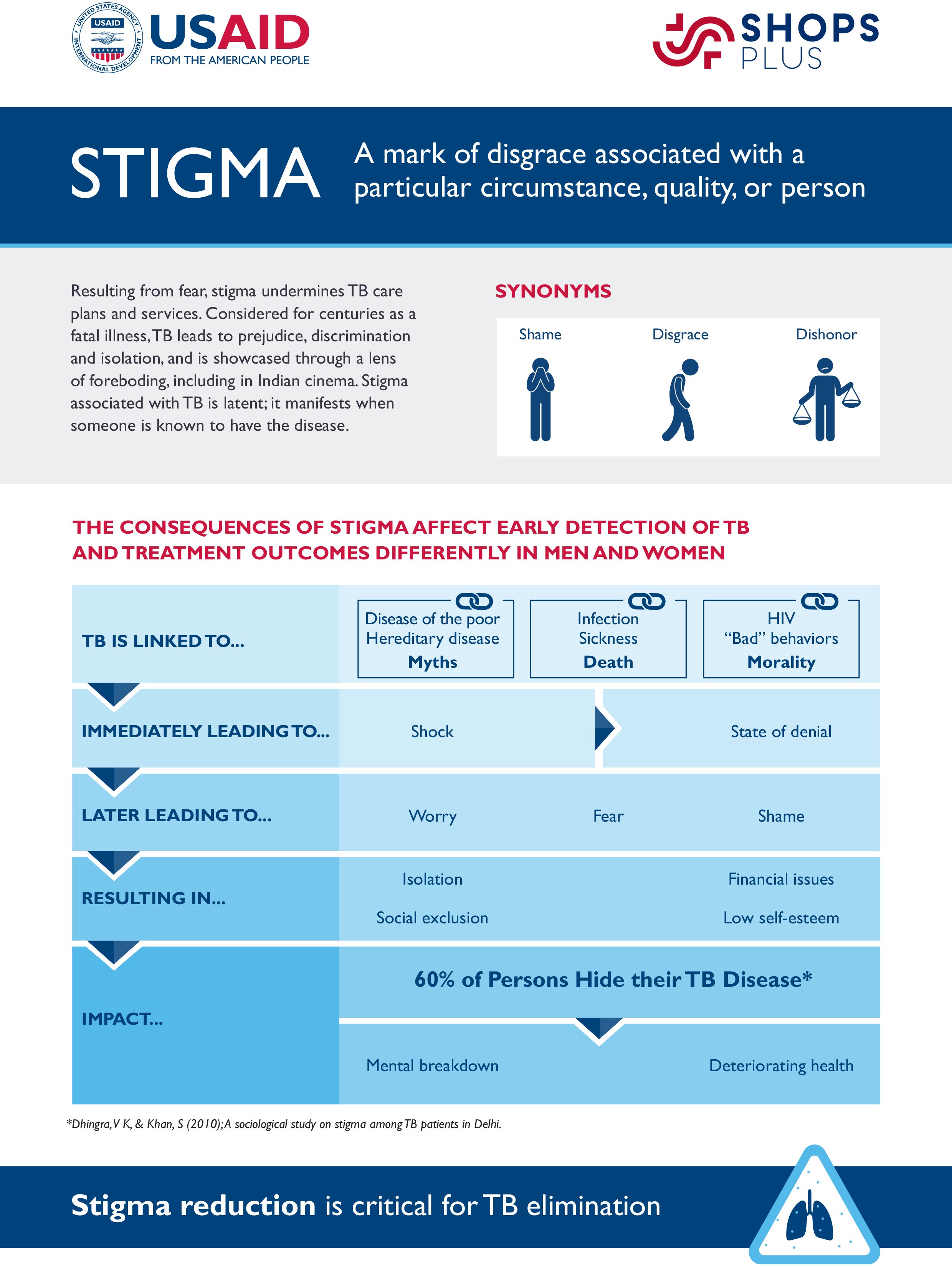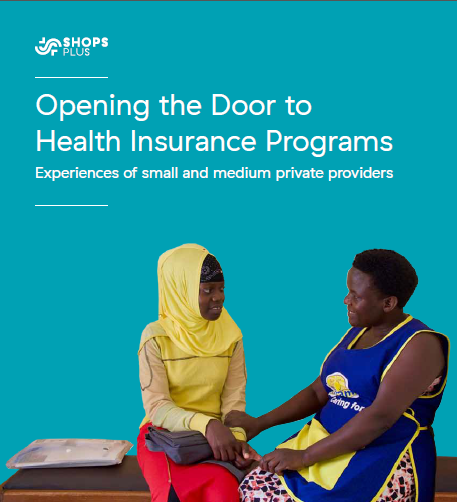
Resource Library
Understanding Family Planning Counseling in the Private Sector through a Behavioral Economics Lens
SHOPS Plus conducted a qualitative study to identify barriers and facilitating factors that influence the provision of family planning counseling by private sector providers in two different country contexts. This brief presents the results of the study using a behavioral economics lens to explore how cognitive and behavioral biases influence the provision of family planning in private sector settings. It provides recommendations to address some of these biases to facilitate appropriate and effective family planning counseling that is tailored to client needs and supports
informed choice.
Resource Type : Brief
Country : India, Malawi
Year : 2019-10-23T14:22:00
Language : English
Project : SHOPS Plus

Resource Library
Knowledge, Attitudes and Practice (KAP) Survey: Key Findings
SHOPS Plus collected data from married couples, caregivers of children under five, and adults in urban India to understand knowledge, attitudes, and practices related to family planning, diarrhea management, and stigma related to tuberculosis. The project is using the findings to inform behavior change campaigns in these health areas. This presentation details the findings of the survey and how the data are being used to inform project activities.
Read the story: Using data for more effective behavior change campaigns
Learn more about the research.
Resource Type :
Country : India
Year : 2019-10-22T12:00:00
Language : English
Project : SHOPS Plus

Resource Library
Understanding Modern Contraceptive Sources Among Adolescents: A Global Analysis
The unique contraceptive needs of adolescents are increasingly recognized among the global family planning community. Recent reports on adolescent contraception emphasize the need for high-quality data to inform efforts to increase adolescent contraceptive use, access, and choice. SHOPS Plus conducted a secondary analysis of Demographic and Health Survey data in 37 countries to examine where adolescents obtain their contraceptives, and how sources vary by method and socioeconomic status. The results elucidate the important role that the private sector plays in helping adolescents meet their reproductive intentions: on average, 40 percent of adolescent users rely on private sector sources, with substantial variation by country. Private sector reliance is higher among urban and wealthy adolescents, but the private sector also serves 1 in 3 poor and/or rural adolescent users. Policymakers and program implementers must include the private sector in efforts to successfully meet contraceptive demand and increase access among youth.
This poster was presented by Sarah Bradley at the Population Association of America Annual Meeting on April 11, 2019 in Austin, TX.
Resource Type : Presentation
Country : Bangladesh, Benin, Ethiopia, Ghana, Haiti, India, Kenya, Malawi, Mali, Nepal, Nigeria, Pakistan, Philippines, Rwanda, Sénégal, Senegal, Tanzania, Uganda, Zambia, Zimbabwe
Year : 2019-07-25T14:54:22
Language : English
Project : SHOPS Plus

Resource Library
Sources of Family Planning: India
Understanding where women obtain their family planning methods can help programs to better target their resources and increase overall access to modern contraception. This brief is one of a series of country briefs that examines where women obtain modern contraception by method, geography, age, and socioeconomic status. Through a secondary analysis of the 2015–16 India Demographic and Health Survey, the brief explains where married modern contraceptive users obtain their method and examines the contribution of the private sector to family planning in India.
Resource Type : Brief
Country : India
Year : 2019-05-31T14:07:00
Language : English
Project : SHOPS Plus

Resource Library
Investing in Stigma Reduction to Eliminate Tuberculosis in India
Resulting from fear, stigma undermines tuberculosis (TB) care plans and services. Considered for centuries as a fatal illness, TB leads to prejudice, discrimination and isolation, and is showcased through a lens of foreboding, including in Indian cinema. Stigma associated with TB is latent; it manifests when someone is known to have the disease. Through stigma reduction, eliminating tuberculosis is possible.
Resource Type :
Country : India
Year :
Language : English
Project : SHOPS Plus

Resource Library
Leveraging the Private Health Sector to Expand the HIV/AIDS Workforce
To make headway in the fight against HIV, many countries have received donor support for employing health workers in the public sector to provide HIV testing, treatment, and follow-up. These health workers have been instrumental in the progress against HIV/AIDS, and are essential for achieving epidemic control. It is uncertain how the workforce for maintaining HIV epidemic control will be supported. The Sustaining Health Outcomes through the Private Sector (SHOPS) Plus project conducted a qualitative study that looks at the private health workforce and the contribution it could make to the HIV response. It examines where along the HIV continuum of care private providers would best be used, the conditions needed for the private sector to invest in staff for HIV-related service delivery, the role of private community-based health workers, and the role of the public sector in strengthening the private health sector’s HIV workforce expansion. The report concludes with recommendations for policy makers, donors, and implementing partners who seek to tap into the private sector to strengthen the HIV response.
Resource Type : Report
Country : India
Year : 2018-10-05T14:08:00
Language : English
Project : SHOPS Plus

Resource Library
Opening the Door to Health Insurance Programs: Experiences of Small and Medium Private Providers
Small and medium private health care providers are valuable partners in scaling up health financing programs that support universal health coverage. However, it is often challenging for them to participate because they have fewer resources and the process can be arduous and costly. The requirements and processes for these providers to participate in health financing programs, and the ease (and pitfalls) of doing so have not been well documented. This brief presents the experiences of small and medium providers who participate in health financing programs, particularly government-sponsored programs. It cites examples from the Dominican Republic, Ghana, India, Kenya, the Philippines, and Tanzania.
Resource Type : Brief
Country : Ghana, India, Kenya, Philippines, Tanzania
Year : 2018-05-22T10:00:00
Language : English
Project : SHOPS Plus

Resource Library
Driving Innovation at the Community Level
This poster discusses the findings from a SHOPS Plus qualitative study, which was conducted to (1) identify effective strategies and tools used by private providers to grow and retain human resources for health and incorporate community-based prevention and outreach activities, and (2) consider how to better engage private providers to support an effective health workforce for HIV. The study was comprised of a global literature review and case studies of private organizations in South Africa and India. Lauren Weir presented the poster at AIDS 2018 on July 26, 2018.
Resource Type : Presentation
Country : India
Year : 2018-07-20T14:45:00
Language : English
Project : SHOPS Plus

Resource Library
Sources for Sick Child Care in India (Presentation)
The private sector is the dominant source of care in India. Understanding if and where sick children are taken for care is critical to improve case management interventions. This slide deck presents a secondary analysis of the 2015–16 India Demographic and Health Survey to examine where treatment or advice is sought for sick children who experience at least one of three treatable illnesses: fever, acute respiratory infection, or diarrhea. These illnesses represent some of the leading causes of death in children under five years old.
Resource Type : Presentation
Country : India
Year : 2018-07-25T12:00:00
Language : English
Project : SHOPS Plus

Resource Library
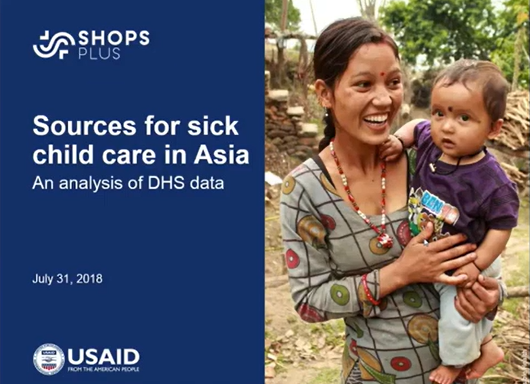
Care Seeking for Child Illnesses A New Look (Asia Webinar)
On Tuesday, July 31, USAID and its flagship private sector health project, SHOPS Plus, hosted the last of its regional webinars that examined trends in the Asia region and highlighted country examples with local speakers from Nepal, Burma, and India.
Presenters:
- Shilu Adhikari of USAID/Nepal
- Ma Myo Aye of USAID/Burma
- Sachin Gupta of USAID/India
Resource Type : Webinar
Country : India, Nepal
Year : 2018-07-31T07:30:00
Language : English
Project : SHOPS Plus
Pagination
- Previous page
- Page 5
- Next page


